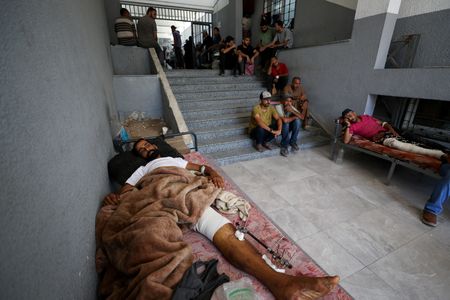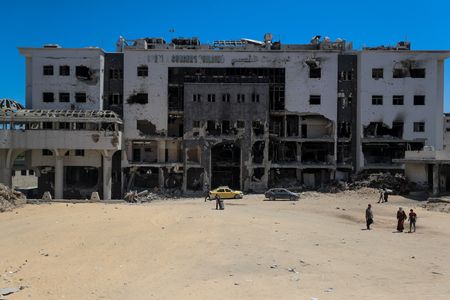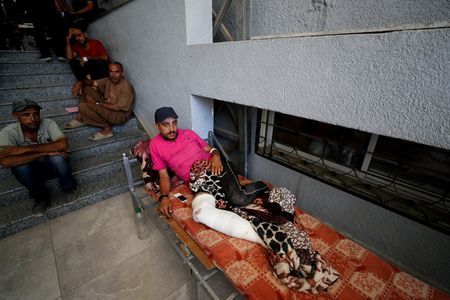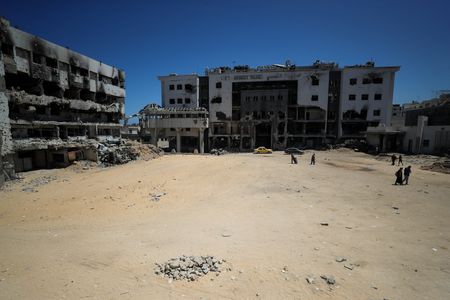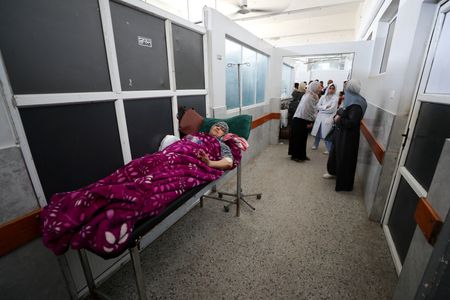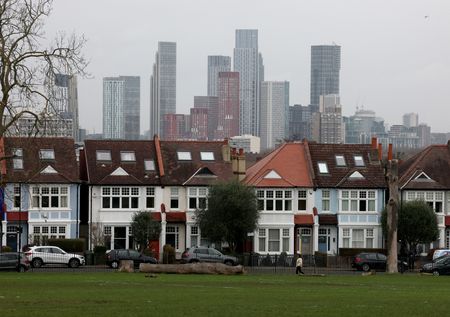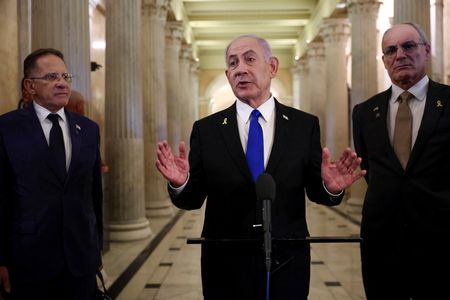By Ali Sawafta
GAZA (Reuters) -Overwhelmed doctors and patients at Gaza’s largest medical centre could soon be plunged into darkness because of dwindling fuel supplies, which doctors say threaten to paralyze Al Shifa hospital as Israel presses on with its military campaign.
While Prime Minister Benjamin Netanyahu discussed the fate of Israeli hostages in Gaza with U.S. President Donald Trump in Washington, Al Shifa’s patients faced imminent danger, doctors there said.
The threat comes from “neither an airstrike nor a missile — but a siege choking the entry of fuel,” Dr. Muneer Alboursh, director general of the Gaza Ministry of Health, told Reuters.
The shortage is “depriving these vulnerable people of their basic right to medical care, turning the hospital into a silent graveyard,” he said.
Israeli airstrikes and relentless bombardment have taken a heavy toll on hospitals in Gaza, a tiny strip of land which was under a long, Israeli-led blockade before the war between Israel and Palestinian militant group Hamas erupted 21 months ago.
Palestinians and medical workers have accused the Israeli military of attacking hospitals, allegations it rejects.
Israel accuses Hamas of operating from medical facilities and running command centres underneath them, something Hamas denies.
Patients in need of medical care, food and water are paying the price.
There have been more than 600 attacks on health facilities since the conflict began, the WHO says, without attributing blame. It has described the health sector in Gaza as being “on its knees”, with shortages of fuel, medical supplies and frequent arrivals of mass casualties.
Just half of Gaza’s 36 general hospitals are partially functioning, according to the U.N. agency.
Dr. Muhammad Abu Salamiyah, Al Shifa’s director, warned of a humanitarian catastrophe due to a fuel crisis posing a direct threat to hospital operations, desalination plants and the water supply system.
He accused Israel of “trickle-feeding” fuel to Gaza’s hospitals.
COGAT, the Israeli military aid coordination agency, did not immediately respond to a request for comment about fuel shortages at Gaza’s medical facilities and the risk to patients.
OXYGEN RISK
Abu Salamiyah said Al Shifa’s dialysis department had been shut down to protect the intensive care unit and operating rooms, which can’t be without electricity for even a few minutes.
There are around 100 premature babies in Gaza City hospitals whose lives are at serious risk, he said.
“Oxygen stations will stop working. A hospital without oxygen is no longer a hospital. The lab and blood banks will shut down, and the blood units in the refrigerators will spoil,” Abu Salamiyah said, adding that the hospital could become “a graveyard for those inside”.
Officials at Nasser Medical Complex in Khan Younis are also wondering how they will cope with the fuel crisis. The hospital needs 4,500 litres of fuel per day and it now has only 3,000 litres, enough for 24 hours, said hospital spokesperson Mohammed Sakr.
Doctors are performing surgeries without electricity or air conditioning. The sweat from staff is dripping into patients’ wounds, he said.
“You can have the best hospital staff on the planet, but if they are denied the medicines and the pain killers and now the very means for a hospital to have light … it becomes an impossibility,” said James Elder, a spokesperson for U.N. children’s agency UNICEF recently returned from Gaza.
The latest bloodshed in the decades-old Israeli-Palestinian conflict was triggered in October 2023, when Hamas-led militants attacked southern Israel, killing around 1,200 people and taking 251 hostages, according to Israeli tallies.
Gaza’s health ministry says Israel’s response has killed over 57,000 Palestinians. It has also caused a hunger crisis, internally displaced almost all Gaza’s population and prompted accusations of genocide and war crimes, which Israel denies.
(Ali Sawafta reported from Ramallah and Mashmoud Issa and Hussam El Masri reported from Gaza; Additional reporting by Emma Farge and Olivia Le Poidevin in Geneva; Writing by Michael Georgy; Editing by Aidan Lewis)

